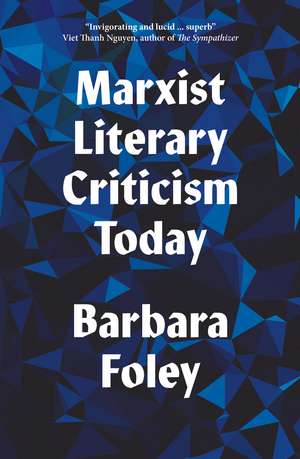Marxist Literary Criticism Today
Autor Barbara Foleyen Limba Engleză Paperback – 19 feb 2019
In the first introduction to Marxist literary criticism in decades, Barbara Foley argues that Marxism continues to offer the best framework for exploring the relationship between literature and society. She lays out in clear terms the principal aspects of Marxist methodology—historical materialism, political economy, and ideology critique—as well as key debates about the nature of literature and the goals of literary criticism and pedagogy. Examining a wide range of texts through the empowering lens of Marxism—from Jane Austen’s Pride and Prejudice to E. L. James’s Fifty Shades of Grey, from Frederick Douglass’s ‘What to the Slave Is the Fourth of July?’ to Annie Proulx’s ‘Brokeback Mountain’—Foley provides a clear and compelling textbook of Marxist literary criticism.
| Toate formatele și edițiile | Preț | Express |
|---|---|---|
| Paperback (1) | 215.00 lei 6-8 săpt. | |
| PLUTO PRESS – 19 feb 2019 | 215.00 lei 6-8 săpt. | |
| Hardback (1) | 652.05 lei 6-8 săpt. | |
| PLUTO PRESS – 19 feb 2019 | 652.05 lei 6-8 săpt. |
Preț: 215.00 lei
Nou
Puncte Express: 323
Preț estimativ în valută:
41.15€ • 44.72$ • 34.59£
41.15€ • 44.72$ • 34.59£
Carte tipărită la comandă
Livrare economică 21 aprilie-05 mai
Preluare comenzi: 021 569.72.76
Specificații
ISBN-13: 9780745338835
ISBN-10: 0745338836
Pagini: 272
Dimensiuni: 152 x 229 x 23 mm
Greutate: 0.48 kg
Editura: PLUTO PRESS
Colecția Pluto Press
ISBN-10: 0745338836
Pagini: 272
Dimensiuni: 152 x 229 x 23 mm
Greutate: 0.48 kg
Editura: PLUTO PRESS
Colecția Pluto Press
Notă biografică
Barbara Foley is distinguished professor of English at Rutgers University, Newark. She has published widely in the fields of Marxist criticism, US literary radicalism, and African American literature. Her books include Wrestling with the Left: The Making of Ralph Ellison’s Invisible Man and Spectres of 1919: Class and Nation in the Making of the New Negro.
Recenzii
“Foley deftly sketches the lineaments of traditional Marxism, then some main interests of traditional criticism, and then shows in readings of literary texts what depth of insight comes from conjoining the two traditions. I warmly recommend this book especially for those who want to change the world as well as interpret it.”
